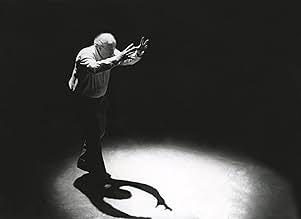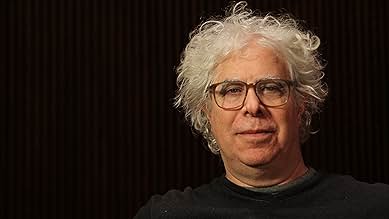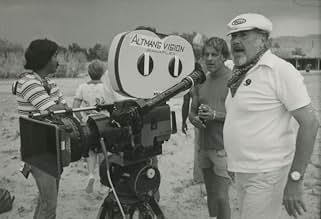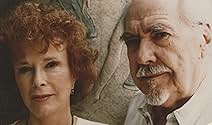IMDb-BEWERTUNG
6,8/10
1521
IHRE BEWERTUNG
Füge eine Handlung in deiner Sprache hinzuA look at the life and work of American film-maker Robert Altman.A look at the life and work of American film-maker Robert Altman.A look at the life and work of American film-maker Robert Altman.
- Auszeichnungen
- 1 Nominierung insgesamt
Robert Altman
- Self
- (Archivfilmmaterial)
Kathryn Reed
- Self
- (as Kathryn Reed Altman)
Donald Sutherland
- Self
- (Archivfilmmaterial)
Dick Cavett
- Self
- (Archivfilmmaterial)
Tommy Thompson
- Self
- (Archivfilmmaterial)
Vilmos Zsigmond
- Self
- (Archivfilmmaterial)
Matthew R. Altman
- Self
- (Synchronisation)
- (as Matthew Reed Altman)
Stephen Altman
- Self
- (Synchronisation)
Richard Nixon
- Self
- (Archivfilmmaterial)
Shelley Duvall
- Self
- (Archivfilmmaterial)
Paul Dooley
- Self
- (Archivfilmmaterial)
Empfohlene Bewertungen
I found this documentary a comprehensive review of Robert Altman's life's work, highlighting the director's determination to be independent of Hollywood conventions. Even though he was born in 1925, Altman was totally in sync with the following generation, the post-war baby boomers who first came of age in the 1960's. His anti-establishment stance never wavers as he thumbs his nose at the military, President Nixon, commercialism, and the election process. One of the most erudite talk show hosts Dick Cavett, a cultural icon of the youth generation, appears in the documentary, a nice touch.
Beginning as a writer of television scripts in the 1940's Altman eventually graduated to being a movie director. The movie MASH is one of the classic anti-war movies that treats it with a large dose of humour. Actors like Elliott Gould and Donald Sutherland seemed to fit the temper of those times. "Nashville" seems to reflect an unease with American culture under the silent majority of Richard Nixon who pandered to the culture of working class white people and their love of country music.
Later, Michael Murphy was tapped for the role of Jack Tanner in Tanner '88, a television show that Altman believes changed television as an entertainment medium. He also had worked with some of the best comediennes such as Carol Burnett and Lilly Tomlin. Altman cast Robin Williams as Popeye in the movie of the same name. It bombed and we are treated to Gene Shalit's review of the debacle. This movie highlighted Altman's belief that the major studios were only interested in blockbusters like Superman and Raiders of the Lost Ark.
One of his most critically acclaimed movies was Gosford Park, with some of the finest British talent available at the time. This movie went beyond the stage-like production of the Upstairs, Downstairs television show and presented a more biting picture of the British class system in a lavish production that also prefigured the success of a much later TV show Downton Abbey.
Among these and other films, we see home movies of Altman, his wife Kathryn and their children. We also see some trenchant comments from Altman himself about his career and work. The documentary gives us a great view of this highly creative American director and his work.
Beginning as a writer of television scripts in the 1940's Altman eventually graduated to being a movie director. The movie MASH is one of the classic anti-war movies that treats it with a large dose of humour. Actors like Elliott Gould and Donald Sutherland seemed to fit the temper of those times. "Nashville" seems to reflect an unease with American culture under the silent majority of Richard Nixon who pandered to the culture of working class white people and their love of country music.
Later, Michael Murphy was tapped for the role of Jack Tanner in Tanner '88, a television show that Altman believes changed television as an entertainment medium. He also had worked with some of the best comediennes such as Carol Burnett and Lilly Tomlin. Altman cast Robin Williams as Popeye in the movie of the same name. It bombed and we are treated to Gene Shalit's review of the debacle. This movie highlighted Altman's belief that the major studios were only interested in blockbusters like Superman and Raiders of the Lost Ark.
One of his most critically acclaimed movies was Gosford Park, with some of the finest British talent available at the time. This movie went beyond the stage-like production of the Upstairs, Downstairs television show and presented a more biting picture of the British class system in a lavish production that also prefigured the success of a much later TV show Downton Abbey.
Among these and other films, we see home movies of Altman, his wife Kathryn and their children. We also see some trenchant comments from Altman himself about his career and work. The documentary gives us a great view of this highly creative American director and his work.
Robert Altman is admired amongst directors and actors, but despised amongst the producers of Hollywood. Isnt it ironic that some of his best work (The Player) is a terrific parody of all the pittfalls Hollywood digs for those trying to make a movie.
I have always wondered why there is such an admiration for him as a director, but the admiration grew out of his love for movie making and his love for the actors. And that love is being returned now. He treated his actors and his movie crew in a way few other Hollywood directors did. Robert Altman's movies seemed to be sort of a family/friends gathering of like minded spirits, who supported each other.
This guy made some terrific movies and he also made quite a few stinkers, movies that really were below par. But Robert Altman's talents never faded, his passion never faded, it was the Hollywood industry that did or did not give him the chance to film the way he wanted to, resulting in periods of success and periods of drought and failures.
I'll always remember Altman for his classic movies. And after seeing this movie I'll also will dearly remember him as a sort of a father of the actor's community. Too bad he got an early stroke, after which he finally had to give up drinking. But up untill then he lived his live to the fullest, giving us audiences worldwide several beautiful movie classics!
BRAVO !!!
I have always wondered why there is such an admiration for him as a director, but the admiration grew out of his love for movie making and his love for the actors. And that love is being returned now. He treated his actors and his movie crew in a way few other Hollywood directors did. Robert Altman's movies seemed to be sort of a family/friends gathering of like minded spirits, who supported each other.
This guy made some terrific movies and he also made quite a few stinkers, movies that really were below par. But Robert Altman's talents never faded, his passion never faded, it was the Hollywood industry that did or did not give him the chance to film the way he wanted to, resulting in periods of success and periods of drought and failures.
I'll always remember Altman for his classic movies. And after seeing this movie I'll also will dearly remember him as a sort of a father of the actor's community. Too bad he got an early stroke, after which he finally had to give up drinking. But up untill then he lived his live to the fullest, giving us audiences worldwide several beautiful movie classics!
BRAVO !!!
10jcbinok
This movie gets a 10 from me because it accomplished what it set out to do: be a career retrospective of Robert Altman, including lots of relevant voices, film clips, home movie footage and words of wisdom from the subject himself. It was heart-felt, and made me tear up a couple times.
I didn't realize I had seen so many of this man's films: The Player (back when the '90's were so fresh and slick), MASH, Popeye. Each one I've seen, I've liked. Now, to check out Gosford Park and McCabe.
I didn't realize I had seen so many of this man's films: The Player (back when the '90's were so fresh and slick), MASH, Popeye. Each one I've seen, I've liked. Now, to check out Gosford Park and McCabe.
The biggest value of Ron Mann's documentary "Altman" is the compilation of Robert Altman's interviews, home movies, unreleased shorts and testimonies by family members and colleagues. All that material was unified by close-ups of several actors who define what the adjective "Altmanesque" means, but a few important ones were left out, people as Altmanesque as can be, as Shelley Duvall, Paul Dooley, Carol Burnett or René Auberjonois. In general, Altman's film work was somehow standardized in this documentary, as if all had the same significance and weight. As an effect of leveling the value and quality of his movies, what we have is a promenade through a life and peculiar oeuvre, that did find obstacles, as it is stated, but with little curiosity for the reasons and motives, and the conceptual and ideological genesis behind Altman and his cinema. When Mann covers Altman's years at Fox, he only gives «3 Women», the peak of that period, a few reflections about acting illustrated by photographs of the shooting and Duvall, Sissy Spacek and Janice Rule (the tree women of the title). Any unsuspecting fellow will never know that this is one of Altman's masterpieces, as such recognized by anyone who knows a little about films. And let's not mention the approach to «Nashville», which is almost reduced to a corollary of a testimony by Richard Nixon about folk music. From the vantage point given by the time that has passed since the releases of «HealtH» (which didn't even have a proper release), «Quintet» and «Popeye», neither does Mann question or evaluate what was written and said about them. He does quote Altman telling a story about «Quintet»: in a meeting at Fox Grace of Monaco questioned Alan Ladd Jr. for letting "that Altman person" put her friend Paul Newman in that "dreadful film". Ladd told her to shut up and quit Fox. Today «Quintet» is seen as an apocalyptic science- fiction dreamscape that completes Altman's surrealist trilogy, after «Images» and «3 Women». Robin Williams died without understanding that in «Popeye» he had given one of his best film performances. Neither Mann seems to understand the film and, in return, concedes valuable time of the documentary to a clip of an unmentionable television film critic who could only mutter nonsense about Altman's vision of E.C. Segar's universe the morning after the film premiere. It must be added too that the appreciation of «Popeye» has improved with the years. As Mann lightly approaches other interesting works, as Altman's theater adaptations («Fool for Love», «Streamers», «Come Back to the 5 & Dime, Jimmy Dean, Jimmy Dean», «Beyond Therapy», all underrated), the biopic «Vincent & Théo», the drama «Kansas City» that follows the structure (if any) of a jazz session, or the comedies he made after his heart transplant (the delirious «Dr. T and the Women» and the moving «Cookie's Fortune», for example), Mann spends more than enough time in «Secret Honor», the television series «Tanner» or »Brewster McCloud» which Altman called his favorite film in an interview in "Film Comment" when he was about to make «Short Cuts». And so goes this work, in which, yes, we can perceive the admiration for the filmmaker, but that in general, as we have stated, misses in its reflection and analysis of the work of one of the greatest American filmmakers of the twentieth century and part of this one (above a few overrated defenders of the status quo), who talked about and filmed his fellow people, his country, its history, its cities, towns, politics, cultures, vices and virtues. And there lies his greatness.
In 2014, a documentary about one of my favourite filmmakers was finally released. This is by no means a perfect documentary, but any film lover or fan of his work absolutely needs to see this.
Robert Altman started from the bottom of showbiz then worked his way up to directing tv shows. How? He did lots of lying. Then in 1970, he started the boom of new up and coming directors trying to make names for themselves. These new directors included Steven Spielberg, Martin Scorsese, and George Lucas, and the movement came to be known as "The New Wave of American Cinema". The year was 1970 and Altman created the well-liked 'Brewster McCloud' and the highly acclaimed anti-war film 'M*A*S*H'. Altman's desire to explore unconventional takes for his films led to making "anti-" films. 'M*A*S*H' had no violence making it anti-war. Some of these other "anti" film included anti-western (McCabe & Mrs. Miller, my personal favourite of his), and anti-friendship (3 Women).
By the late 70s, Altman was falling into a slump when his film 'Quintet' didn't live up to expectations of his earlier masterpieces. But it was the his live action take on 'Popeye' in 1980 that ruined his film career throughout the rest of the decade. Barely getting film offers anymore, he tried directing theatre. He loved theatre just as much.
Things were looking up when he made the darkly comical satire 'The Player' in 1992. He was back on top again. Everything about that film is pitch perfect. A year later he does 'Short Cuts', one of the best epics with multiple stories ever made. The remainder of his career saw some back and forth hits with his Agatha Christie inspired 'Gosford Park' and final film project 'A Prairie Home Companion' being notable highs.
It felt to me that this documentary moved a little too fast. Rather than gliding along everything, it tried to fit into some kind of allotted time. And I also felt that they should have gone into more detail on what made Robert Altman an auteur.
So this may not be perfect, but it is definitely a movie-lover's dream come alive.
3.5/4
Robert Altman started from the bottom of showbiz then worked his way up to directing tv shows. How? He did lots of lying. Then in 1970, he started the boom of new up and coming directors trying to make names for themselves. These new directors included Steven Spielberg, Martin Scorsese, and George Lucas, and the movement came to be known as "The New Wave of American Cinema". The year was 1970 and Altman created the well-liked 'Brewster McCloud' and the highly acclaimed anti-war film 'M*A*S*H'. Altman's desire to explore unconventional takes for his films led to making "anti-" films. 'M*A*S*H' had no violence making it anti-war. Some of these other "anti" film included anti-western (McCabe & Mrs. Miller, my personal favourite of his), and anti-friendship (3 Women).
By the late 70s, Altman was falling into a slump when his film 'Quintet' didn't live up to expectations of his earlier masterpieces. But it was the his live action take on 'Popeye' in 1980 that ruined his film career throughout the rest of the decade. Barely getting film offers anymore, he tried directing theatre. He loved theatre just as much.
Things were looking up when he made the darkly comical satire 'The Player' in 1992. He was back on top again. Everything about that film is pitch perfect. A year later he does 'Short Cuts', one of the best epics with multiple stories ever made. The remainder of his career saw some back and forth hits with his Agatha Christie inspired 'Gosford Park' and final film project 'A Prairie Home Companion' being notable highs.
It felt to me that this documentary moved a little too fast. Rather than gliding along everything, it tried to fit into some kind of allotted time. And I also felt that they should have gone into more detail on what made Robert Altman an auteur.
So this may not be perfect, but it is definitely a movie-lover's dream come alive.
3.5/4
Wusstest du schon
- Zitate
Robin Williams: Altmanesque? Ha-ha. Expect the unexpected.
- Crazy CreditsNo hippies were harmed in the making of this movie.
- VerbindungenFeatures Begegnung (1945)
- SoundtracksLes Boréades: Overture
Written by Jean-Philippe Rameau (as Jean-Phillipe Rameau)
Performed by John Eliot Gardiner
Top-Auswahl
Melde dich zum Bewerten an und greife auf die Watchlist für personalisierte Empfehlungen zu.
Details
Box Office
- Weltweiter Bruttoertrag
- 996 $
Zu dieser Seite beitragen
Bearbeitung vorschlagen oder fehlenden Inhalt hinzufügen





















